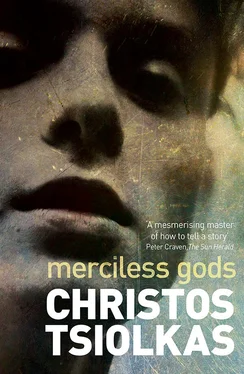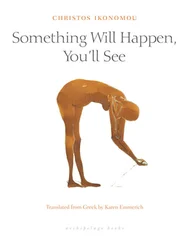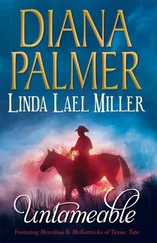•
My mother adored Victor. ‘He’s such a beautiful man,’ she would say to me in German, loudly, so he could hear. ‘He is a god.’
She flirted with him and he basked in her admiration. And of course he loved her notoriety; I’m sure that he was writing letters back home nonchalantly mentioning that his German lover’s mother had sucked off Paul McCartney and was a celebrated cult writer. But he also saw how mean alcohol could make her. One terrible night, in a bar on the Dudenstrasse, my mother flayed me viciously, insulting my looks, my intelligence, my beliefs, my hopes, my dreams.
‘You are a nothing,’ she accused. She prided herself on being non-violent — oh yes, she was all peace and fucking love — but I’d rather she had smacked me or punched me or scratched my face. It would have been easier to bear.
Victor shouted at her, I had never seen him so furious, and he led me away as I wept, my eyes swollen, everyone staring at us.
It was a bitterly cold night. That ruthless Berlin wind was carving right through us and I just kept saying to him, ‘Take me to Australia, please take me away from here, please take me to your home.’
And Victor, who had been dreaming about the romance of Europe since adolescence, who had read across philosophy and philology in order to be an intellectual in Europe, agreed. He held me in his arms that night on a bench in the Britzer Garten, and told me about swimming in the savage ocean, about the smells of the desert, about crocodiles and wombats and kangaroos.
It was February and I worked double shifts at the bar to save money. In April, two years before the fall of the Berlin Wall, I bought my one-way ticket to Australia.
•
My mother’s second book is called Brüderchen und Schwesterchen — Brother and Sister . It is a dark, unsettling fable, pornographic and compelling. It begins with two adolescent siblings discovering that their mother has disappeared. The father is long dead and there seems to be no one else in the village they trust or who shares any kinship with them. No location is named, nor a year, but through some carefully placed clues — the styling of the boy’s collar; a film magazine with Fredric March on the cover — we know it takes place in the early 1930s. Left alone, Rolf and Lisbeth, the brother and sister, begin to play at marriage, first cautiously, then passionately, and finally, desperately. The danger and release of their fucking is intoxicating but very soon they begin to tear at each other, wanting to destroy one another. By the end they have starved to death, Rolf expiring first as Lisbeth lies next to him. She hears his final breath and she also believes she can hear the first soft murmurings of their child’s heartbeat deep inside her.
It is, of course, perverse; the unrepentant eroticism of her portrayal of incest was deemed outrageous, but by the end of the twentieth century, scandal no longer necessarily meant being an outcast. The book was a tremendous critical success. And that is how it should be. Brother and Sister gets under your skin and remains there; after reading it you want to raise your head and gulp for air, so entirely has her writing seduced you and dragged you into the siblings’ squalid, hermetic world.
Many critics wrote of the novel as some kind of allegory of German history, sifting through the text to uncover metaphors for Weimar or for the divided Germanys of the Cold War. Undoubtedly such readings are accurate, but I am not a critic. My mother always had too much to say about history. But I think that novel is her finest work not because of the ferocity of her writing but because it is not a story about herself. I can read it without seeing her, something I cannot do with the memoir. I wonder too about the dead father in the novel. By the fogginess of the children’s recollections of him it is clear that he died in the Great War. Their memories of him are tender. We understand that the mother’s desertion of her children may have arisen from her inability to come to terms with the loss of her husband.
The story is oblique but, as it was written after my grandmother’s death, I’d like to believe that Brother and Sister was also a rapprochement with my Oma’s ghost, that for the first time my mother could look at her personal past with some tenderness and could admit to her own mother’s suffering.
We never really had the chance to have that conversation. I didn’t return to Germany for the publication of the second book, though I sent her a long lauding letter when I read it, and when I started to speak about it that last time in Hamburg, she dismissed my question with an exaggerated groan. ‘ Mein Gott! It’s just a fucking book, don’t take it too seriously.’
Victor, of course, who desires happy endings in reality if not in fiction, remains convinced that the novel proves that my mother had forgiven her own mother. All I know is that the morning we had agreed to visit my Oma’s grave, my mother rang, off her face, incoherent, to say she couldn’t make it.
Unlike Victor, I am sceptical of happy endings.
•
My mother died just after her last book was published. It is a self-lacerating story, another memoir, about the destruction of age. It is merciless and very funny. She describes what it is like to try and masturbate when your cunt has become so dry that even poking one little finger up there causes unbearable pain, how the smells her body emits disgust her, what it is like to wake up after a night of boozing with excrement caking your buttocks and your thighs. She describes hiring a young Turkish man to touch her, to just run his fingers across her tits, her stomach, her cunt; how she witnessed the grim concentration in his eyes as he fought back his aversion to her body. The author is aware of the great cosmic joke time has played on her, leaving her lust and her fantasies sharp, youthful and intact, while deracinating and drying up the ageing body. And that is its title, Zeitlich. Time.
My mother was out of time.
•
Victor and I had a terrible argument that last trip to Germany. Dismayed by how feeble and ill my mother was, he wanted to bring her home with us. When I demurred, he accused me of abandoning her. I thought him ridiculous. He had just read her fucking book. Was he prepared to clean up her shit every morning? Did he really believe she would be happy in our California bungalow in Melbourne? Did he really think my mother would be content tending to the vegetable patch and pretending to be interested in the endless stories from Mrs Koulouris next door about her grandchildren?
He didn’t want to listen. ‘It’s our responsibility,’ he insisted. ‘We have to take care of her. Don’t you love your mother?’
‘I do,’ I yelled back, ‘but I don’t particularly like her.’
His face was purple with fury. ‘You’re inhuman,’ he spluttered, ‘just inhuman.’
We thought my mother was asleep in her bedroom but at that moment she came into the living room wearing an open robe and nothing else, and filled a dirty glass with the cheap red wine she loved drinking. Victor turned away, embarrassed by her nakedness.
My mother gulped hungrily from her glass, finished it and refilled it. She wiped her cracked, wine-stained lips with a sleeve. ‘Victor, darling,’ she said, ‘I think you are adorable, but for Christ’s sake, stop being so insufferably petit-bourgeois .’
Danke, Mama, danke schön .
She died in her sleep. Her wish was to be cremated. I returned to Germany for her funeral and it was during that time that I discovered for myself the wonderful numbing panacea of alcohol. Throughout the organisation of her funeral, the endless conversations with journalists and critics, I drank. I drank from morning to night, I was drunk at the service, I was drunk at the wake, I was drunk on the flight home.
Читать дальше












